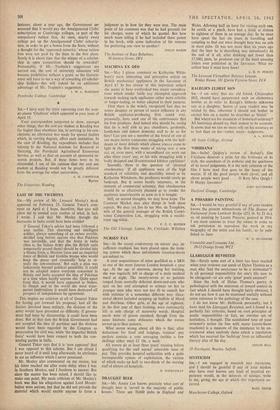MACHINA EX DEO
SIR,—May I please comment on Katharine White- horn's most interesting and perceptive article on British mechanical appliances in the Spectator of April 6? In her review of this important subject she seems to have overlooked two major considera- tions which render futile any attempted approach towards making such, appliances either more reliable or longer-lasting, or better adapted to their purpose.
First there is the widely recognised fact that no senior designer or person of major influence in any British .appliance-producing firm could ever, personally, have used one of the contrivances that his firm produces. And indeed why should he, seeing that he is well able to, pay chauffeurs, gardeners, handymen and indoor domestic staff to do so for him? Can you see a member of the board of one of our major motor companies struggling with the'.half- dozen or more defects which almost always come to light in the first three weeks of taking over a new car, or, even more, with a secondhand car worn out after three years' use; or his wife struggling with a badly designed and ill-constructed kitchen appliance?
Secondly, there is the question of 'planned obsolescence.' If all appliances were of the high standard of reliability and durability aimed at by Katharine Whitehorn, the producers would surely go bankrupt. But it seems hardly necessary, in the interests of commercial solvency, that obsolescence should be so effectively planned as to render the appliance unserviceable as soon as it is bought.
Still, on second thoughts, we may have hope. The Common Market may alter things in both these aspects, We may yet live to see Mrs. de Tompkins, wife of the general manager of the British Contri- vance Corporation Ltd., struggling with a recalci- trant egg-whisk.
F. E. C. HUGHES The Old Vicarage, Latton, Nr, Cricklade, Wiltshire


































 Previous page
Previous page